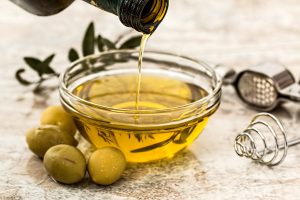 At LIV Fitness in Dublin, CA, we provide personalized diets, but one thing they all have in common is that they contain three macronutrients, fat, protein and carbohydrates. Each diet is personalized, so the types of foods in these groups and balance of nutrients vary. Extra virgin olive oil is one of the healthiest fat, but are there ones that are equally healthy or even healthier? That’s particularly important for anyone that can’t consume olive oil or simply don’t like it.
At LIV Fitness in Dublin, CA, we provide personalized diets, but one thing they all have in common is that they contain three macronutrients, fat, protein and carbohydrates. Each diet is personalized, so the types of foods in these groups and balance of nutrients vary. Extra virgin olive oil is one of the healthiest fat, but are there ones that are equally healthy or even healthier? That’s particularly important for anyone that can’t consume olive oil or simply don’t like it.
Don’t freak out when you hear there’s fat in your diet.
Some people try to steer clear of any food that has fat and that’s absolutely wrong. Fats play an important role in a healthy diet, but not all fats are equally healthy. Healthy fats are necessary for many bodily functions. It’s why they’re one of the macronutrients. They help maintain good cholesterol and blood sugar levels, help prevent weight gain, decrease inflammation, improve brain functioning, improve liver health, strengthen bones, improve skin and aid sleep.
There’s more than one type of fat.
Fats are most commonly categorized by the length of their carbon chain, as in long, medium and short chain fatty acids and also by their chemical composition. They’re made up of carbon, hydrogen and oxygen and are classified based on their carbon chain and the number of double bonds present, if any. Unsaturated fats: most polyunsaturated, monounsaturated and some saturated fats are good for you. Trans fats, a form of unsaturated fat that is now in its own category, is bad for you.
Which unsaturated fat and saturated fat is healthy?
Most unsaturated fats come from plants. They’re liquid at room temperature. Olive oil is one, but there are others. Avocado, nuts—almonds and pecans—and pumpkin or sesame seeds contain monounsaturated fat and are quite healthy. Sunflower seeds, flaxseed walnuts, fatty fish and canola oil are polyunsaturated. Omega-3 fatty acids, touted for good health are the polyunsaturated fats that are found in fish, walnuts and soybean oil. Saturated fat can improve brain, cardiovascular, bone, nervous system and immune health.
- Consuming a variety of fats can help you be healthier, as long as you don’t include trans fats. Eight to ten percent of your daily calories should come from sources of polyunsaturated fats. Just switching some of your saturated fat calories to unsaturated ones can improve your health.
- One study showed that switching your carbs to healthy polyunsaturated and monounsaturated fats increased the healthy cholesterol—HDL—and decreased the bad type—LDL.
- Beware of the “diet foods” that are low or no fat. The companies remove the fat, but they replace it with sugar, to make it more palatable. Sugar is far more unhealthy than most fats.
- Foods with healthy saturated fat include coconut oil, avocados, olives, butter from cows that are grass-fed, nuts and animals that are raised free-range and natural. The amount you need depends on your body.
For more information, contact us today at LIV Fitness
